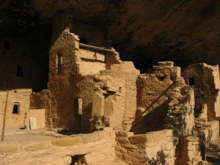Article
In the Southwestern U.S., the primary setting for Tony Hillerman's Navajo detective series, ruins typically refer to ancient Puebloan structures that are scattered across the landscape, from cliff dwellings in high canyon alcoves to complex urban and road structures such as those found in Chaco Canyon. The relative remoteness and ruggedness of the Southwest also took its toll on European settlers, and remnants of Spanish rancheros, Hispanic villages, and Anglo-American ghost towns are found along networks of two-track dirt roads, ephemeral waterways, and defunct railroad spur lines.
At the turn-of-the-century in the Southwest, Puebloan ruins "discovered" by photographers, artists, and commercial entrepreneurs provided the perfect backdrop for marketing the Southwest as a land of ancient cultures with haunting echoes of lost civilizations. Since the Renaissance, European cultures tend to revisit their ruins, as ruins were thought to symbolize innate beauty and timeless value. Especially during the Romantic period in the late 18th and early 19th centuries, ruins were artificially and artfully juxtaposed into manipulated landscapes to emphasize the picturesque "wilderness" of the landscape.
In comparison, Native American cultures in the Southwest tend to maintain a tradition of staying away from these abandoned sites, associating them ancestor spirits. This intentional distancing is a sign of respect for the ancestors, who are believed to remain tied to these places.
"Spruce Tree House, Mesa Verde National Park, July 29, 2010" by Ken Lund is licensed under CC BY-SA.
Manuscripts
A01 The Blessing Way (01-07) p. 13
A01 The Blessing Way (01-07) p. 35
A01 The Blessing Way (01-07) p. 65
A01 The Blessing Way (01-07) p. 79
A01 The Blessing Way (01-07) p. 82
A01 The Blessing Way (01-07) p. 167
A01 The Blessing Way (01-07) p. 171
A01 The Blessing Way (01-07) p. 191
A01 The Blessing Way (01-07) p. 199
A01 The Blessing Way (01-07) p. 205
A01 The Blessing Way (01-07) p. 209
A01 The Blessing Way (01-07) p. 210
A01 The Blessing Way (01-07) p. 214
A01 The Blessing Way (01-07) p. 220
References
Day, Aidan
1996 Romanticism. New York: Routledge.
Hunt, John Dixon
1975 The Genius of the Place: The English Landscape Garden. London: Elek.
Prévôt, Prevot
2008 Histoires des Jardins. Bordeaux: Editions Sud Oest.
Woodward, Christopher
2001 In Ruins. New York: Parthenon Books.

